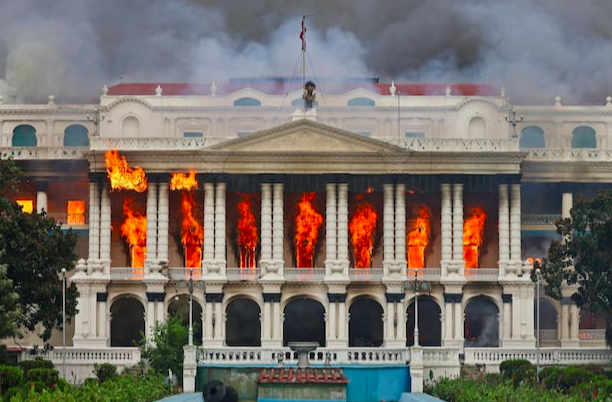A single TikTok video is all it took to capture the attention of Nepal. The TikTok video, showing a lavish wedding of the daughter of a Nepalese politician, gained the likes and shares on the internet for boasting the luxurious lives of politicians, or specifically, “nepo babies,” children of notorious yet rich celebrities. More reels, showing politicians’ daughters and sons traveling on private jets, eating at buffets, and relaxing in resorts, have only added fuel to the flames of Nepalese Generation Z.
For years, Nepalese prime ministers, specifically Prime Ministers K.P. Oli, Pushpa Kamal, and Dahal, have faced allegations of misuse of public funds. This concern stemmed from Nepal ranking 108th out of 180 countries in the Transparency Global Corruption Barometer. With the ‘Nepo baby’ trend circulating on the internet, the allegations of nepotism eroded public trust and confidence in the government, prompting younger generations to protest against the Nepalese government for corruption.
However, unlike previous generations, Generation Z fully utilized the power of social media to spread awareness of the government corruption present in Nepal. More reels and videos going against the nepo babies online catalyzed Nepal’s protests.
In response to the online havoc caused by Nepalese Generation Z, Prime Minister Oli decided to officially ban 26 social media apps. The decision, made to monitor social media use in the country, only infuriated and prompted people to assault the government-related sectors—burning minister constructions, assailing politicians, and increasing protestors near government-owned properties.
“I never could have thought that the people were ever angry or discomforted by the government,” Steve Nave, former Nepal trip adviser, said. “When I visited the country, the people were nice, gentle, and seemingly living well. Though it might not be as rich as other countries, I thought they were happy, so these protests definitely surprised me.”
As a result of the ongoing protests, Oli and multiple other ministers were evacuated from the government buildings on Sept. 9. Videos on the internet spread about the evacuation, prompting the young Nepali generation to decide on a few things: dissolve the current parliament and begin an interim government, a temporary administration made to manage a nation during times of turmoil.
“I never thought Nepal would become a country of turmoil so quickly,” Grace Kim (9), former Nepal tourist, said. “When I first visited Nepal, I knew it was a country of peace and nature. It was really a beautiful place to travel to, and on the surface, through the lens of a tourist, maybe it makes sense that people from the outside could guess what the internal struggles were inside the country.”
However, due to the unusual younger demographic of the protests, the decision to elect who leads the interim government was unconventional through the use of a single app: Discord. Discord, an app typically used for virtual gaming and forum discussions, held a group chat with over 8,000 Nepali activists, all putting in a vote on who would lead the temporary government.
In the end, Former Chief Justice Sushila Karki got elected as Nepal’s first female prime minister. Upon taking office, Karki immediately took action to dissolve the lower chamber of the parliament to prevent monetary corruption and announced that national elections would take place in March 2026. Presently, the only goal of Nepal is to revitalize peace and to prevent unfair disparities in power between the rich government and the people.
“Nepal does not deserve the torture or the economic disparities that it faces; in fact, no country does,” Joonho Kim (12), former Nepal school trip attendee, said. “From my experience, it is a country full of beauty, from the people to the trees and even the animals. Every country should not be faced with the hard decision of choosing whether to starve or die out. The power of Generation Z is stronger than you might think. They have both the internet and the fire on their hands.


